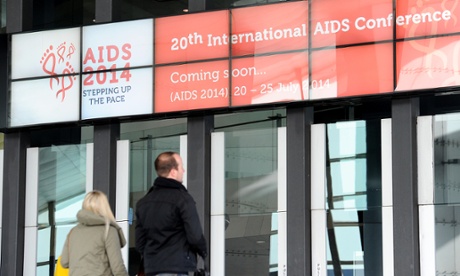Session held ahead of Aids 2014 conference told email exchanges show about 100 attendees booked on flight MH17

As many as 100 of the world’s leading HIV/Aids researchers and advocates may have been on the Malaysia Airlines flight that crashed in Ukraine, in what has been described as a “devastating” blow to efforts to tackle the virus.
Delegates to a plenary session held ahead of the Aids 2014 conference were told that email exchanges showed about 100 attendees were booked on the MH17 flight. The plane was downed in eastern Ukraine by what the US and Australian governments have described as a surface-to-air missile.
There was no official confirmation of the number of researchers on board.
There were no survivors among the 298 people on the flight, which was bound for Kuala Lumpur from Amsterdam. The Aids 2014 conference, due to start on Sunday, is being held in Melbourne.
“There’s a huge feeling of sadness here, people are in floods of tears in the corridors,” Clive Aspin, a veteran HIV researcher who attended the pre-conference plenary session in Sydney, told Guardian Australia. “These people were the best and the brightest, the ones who had dedicated their whole careers to fighting this terrible virus. It’s devastating.”
Prof. Richard Boyd, director of the Monash Immunology and Stem Cell Laboratories, told Guardian Australia he was “gutted” by the losses.
“There were some serious HIV leaders on that plane,” he said. “This will have ramifications globally because whenever you lose a leader in any field, it has an impact. That knowledge is irreplaceable.
“We’ve lost global leaders and also some bright young people who were coming through. It’s a gut-wrenching loss. I was involved in the aftermath of 9/11 in New York and it brings back that level of catastrophe.
“But the Aids community is very close-knit, like a family. They will unite and this will galvanise people to strive harder to find a breakthrough. Let’s hope that, out of this madness, there will be new hope for the world.”
Trevor Stratton, an HIV/Aids consultant, told the ABC: “The cure for AIDS may have been on that plane, we just don’t know. You can’t just help but wonder about the kind of expertise on that plane.”
A number of leading scientists, including a former president of the International AIDS Society (IAS) who has led HIV research efforts since 1983, are believed to be among the dead.
Organisers of Aids 2014, which is set to welcome about 14,000 delegates from around the world, said they were unable to officially confirm the number of people on MH17 who were due to attend the conference. The organisation said in a statement: “The IAS is hearing unconfirmed reports that some of our friends and colleagues were on board the flight and if that is the case this is truly a sad day.”
The president of the IAS, Françoise Barré-Sinoussi, told a prearranged event in Canberra that the deaths “will be a great loss to the HIV/Aids communities. If confirmed, it would be a terrible loss for all of us. I have no words really to try to express my sadness; I feel totally devastated if it is confirmed.”
IAS said the conference would go ahead as scheduled. Former US president Bill Clinton and activist Bob Geldof are due to speak.
The executive director of the Australian Federation of Aids Organisations, Rob Lake, said: “This morning’s news is absolutely tragic and will be felt throughout the conference and worldwide.
“The people we have lost have played critical roles in the global fight against HIV.”
